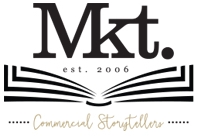

Mkt. Communications

Victoria, Australia
December 2015
Advertising & market research
Service with Minor Environmental Footprint
Australia
Mkt. Communications call themselves commercial storytellers. They're savvy raconteurs, telling insightful strategic stories that reflect the unique characteristics of a brand, based on simple truths and insights. They work collaboratively with local and international brands to deliver outstanding work with tangible results. They’re honest. They have courageous conversations with their clients and they sometimes tell them things they don’t want to hear, with great outcomes. They listen and they encourage their clients to listen as they believe that brands have ears too. Like all storytellers, Mkt. Communications realises it’s in the delivery and without a compelling story, they're out of business. Over the last few years, Mkt. has grown organically, intrinsically passionate about sustainability, we’ve sought out like-minded clients, and they now represent a number of engaging brands who are redefining success in business. Mkt. Communications believes step change will happen when the business community embraces the new economy and finds innovative ways of operating in it. As a team, they have set out to break the work-life balance model with a new way of being.
Overall B Impact Score
Governance 15.8
Governance evaluates a company's overall mission, engagement around its social/environmental impact, ethics, and transparency. This section also evaluates the ability of a company to protect their mission and formally consider stakeholders in decision making through their corporate structure (e.g. benefit corporation) or corporate governing documents.
What is this? A company with an Impact Business Model is intentionally designed to create a specific positive outcome for one of its stakeholders - such as workers, community, environment, or customers.
Workers 28.7
Workers evaluates a company’s contributions to its employees’ financial security, health & safety, wellness, career development, and engagement & satisfaction. In addition, this section recognizes business models designed to benefit workers, such as companies that are at least 40% owned by non-executive employees and those that have workforce development programs to support individuals with barriers to employment.
Community 27.4
Community evaluates a company’s engagement with and impact on the communities in which it operates, hires from, and sources from. Topics include diversity, equity & inclusion, economic impact, civic engagement, charitable giving, and supply chain management. In addition, this section recognizes business models that are designed to address specific community-oriented problems, such as poverty alleviation through fair trade sourcing or distribution via microenterprises, producer cooperative models, locally focused economic development, and formal charitable giving commitments.
Environment 11.0
Environment evaluates a company’s overall environmental management practices as well as its impact on the air, climate, water, land, and biodiversity. This includes the direct impact of a company’s operations and, when applicable its supply chain and distribution channels. This section also recognizes companies with environmentally innovative production processes and those that sell products or services that have a positive environmental impact. Some examples might include products and services that create renewable energy, reduce consumption or waste, conserve land or wildlife, provide less toxic alternatives to the market, or educate people about environmental problems.
Customers 6.8
Customers evaluates a company’s stewardship of its customers through the quality of its products and services, ethical marketing, data privacy and security, and feedback channels. In addition, this section recognizes products or services that are designed to address a particular social problem for or through its customers, such as health or educational products, arts & media products, serving underserved customers/clients, and services that improve the social impact of other businesses or organizations.
What is this? A company with an Impact Business Model is intentionally designed to create a specific positive outcome for one of its stakeholders - such as workers, community, environment, or customers.